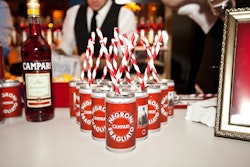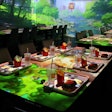
Rebecca Katz, executive chef and faculty member at the Center for Mind-Body Medicine in Washington, will deliver a keynote address Tuesday at the America's Incentives, Business Travel & Meetings Exhibition at McCormick Place.
Focusing on brain food for meeting attendees, Katz will deliver tips on catering that fuels creative and strategic thinking. In advance of her speech—and for those not at the Chicago conference— Katz spoke with BizBash about better menus for meetings, the downside of fried foods, and the future of event menus.
Tell us about your job. What are your main goals as an author, educator, chef, and faculty member at the Center for Mind-Body Medicine’s Food As Medicine Training Program?
My main goals as a chef and educator are to help people find the connections between health and food. I have a particular flair for being able to translate science to the plate. As a trained chef and a M.S. in nutrition, I know that taste and flavor really drive what people like to eat. I focus on taking the conversation around what we should or shouldn’t eat and translate that into smart food choices that are both accessible and delicious.
When you speak at conferences such as AIBTM, what types of information are meeting planners most (pardon the pun) hungry for?
Meeting planners are hungry to be actively engaged in learning more about the connection between what we eat and how we feel. My goal at AIBTM is to help meeting planners understand the connection between what their event participants are eating, how they’re feeling, and how that’s going to affect their productivity at a meeting. If you provide a lunch menu that is full of processed food, sugar-laden foods, or gluten-heavy foods, participants eat lunch then want to take a snooze and their minds won’t actively be engaged. There is a way to design a menu and work with a chef to create a menu that is unbelievably delicious, but also where people aren’t walking away feeling bloated, full, and heavy. Good brain food is going to help to keep attendees actively engaged in learning, networking, and being productive for the long run. Food choices should not be an afterthought, but rather a part of the whole picture.
Are meeting planners today educated about making smart, healthy menu selections? Or is there still substantial room for growth?
I think there is a lot of room for growth and opportunity for meeting planners to better understand how healthy menu selections can truly boost the overall productivity of their events and meetings. There seems to be an awakening consciousness that brain food is an important part of the puzzle. What we eat really has an impact on how we feel.
How do you stay in tune with the latest health trends and innovations?
It’s my job to really dig deep and look at studies and know the current research and trends. I go through and process all this information, but my guiding compass is that health food fads come and go, but I always come back to the idea that whole, real foods—foods that have been around for years and years—are always the best options. I also draw a lot of inspiration just walking around the farmer’s market. My idea of healthy isn’t just following along the latest trend. My job is to be a myth buster and keep people grounded in what’s doable long-term.
What are some of the best brain foods for meetings?
Some of the best brain food is protein. Instead of having a breakfast with sugar-laden danishes and carb-loaded bagels, it is so much better to have eggs, salmon, plus fruits like berries, and blueberries especially. Protein is going to give attendees the boost they need, but if they eat a danish first thing in the morning their blood sugar spikes then crashes. A good brain food breakfast menu would include huevos rancheros, veggie scramble or frittata, and fruit. Coffee is a good brain food, too, so that doesn’t need to go away.
If you could abolish one common appetizer or meeting snack from caterers’ menus, what would it be?
I think that anything fried should be abolished. I was at an event recently where they took an olive, stuffed it with cheese and fried it! Instead of frying the olive, it would have been a better choice to have a simple roasted olive. Foods that are fried in bad fats do not provide the clean nutrients needed to sustain productivity during a meeting or event.
What are some tips for event pros or business travelers who constantly eat on the road or on the run?
Make your own trail mix and always carry a bag of almonds, walnuts, and dried fruits to keep in your briefcase or purse at all times. Nuts are the perfect brain food because they provide a good amount of healthy carbs, protein, and fat. Just a handful will keep you satiated and your blood sugar regulated.
Tell us about an event that served “smart food” and had measurable success.
The Center for Mind-Body Medicine has a Food Is Medicine conference where I’ve been the executive chef since 2004, and all the post-event surveys highlight how excited the attendees are about the food. Instead of the usual hotel bagel and sandwich catering, our menu consisted of miso-glazed salmon and jicama cabbage slaw, rice paper rolls stuffed with veggies, triple citrus black cod—the food is incredibly veggie-heavy but interesting in terms of flavor. This is an event where doctors are learning about nutritional science, but what does that look like on the plate? When people hear that there’s going to be a healthy menu they might automatically think it won’t taste good, but I make sure all the flavors are alive and balanced so their taste buds can do the convincing.
Afterwards we hear things like, “I was able to go to the conference and stay alert;” “the food was a highlight;” “I’m going to make this when I get home.” This is especially important with meeting planners who are confronted with so many options, but the one end goal should be for people to feel good, alert, and satisfied.
How will event menus change in the next few years?
As people start developing more and more food sensitivities, there will be a demand for specific food needs. Planners need to be flexible and know that meeting food is going to become a lot more dynamic and health-driven moving forward. This doesn’t mean it has to be devoid of taste. Also, I think meeting planners will take a more active role with chefs and food service providers to drive the train more to facilitate their clients' needs.
No one can be good 100 percent of the time. What’s your favorite splurge item?
Dark chocolate with 70 percent cacao! It’s a really great brain food.



















